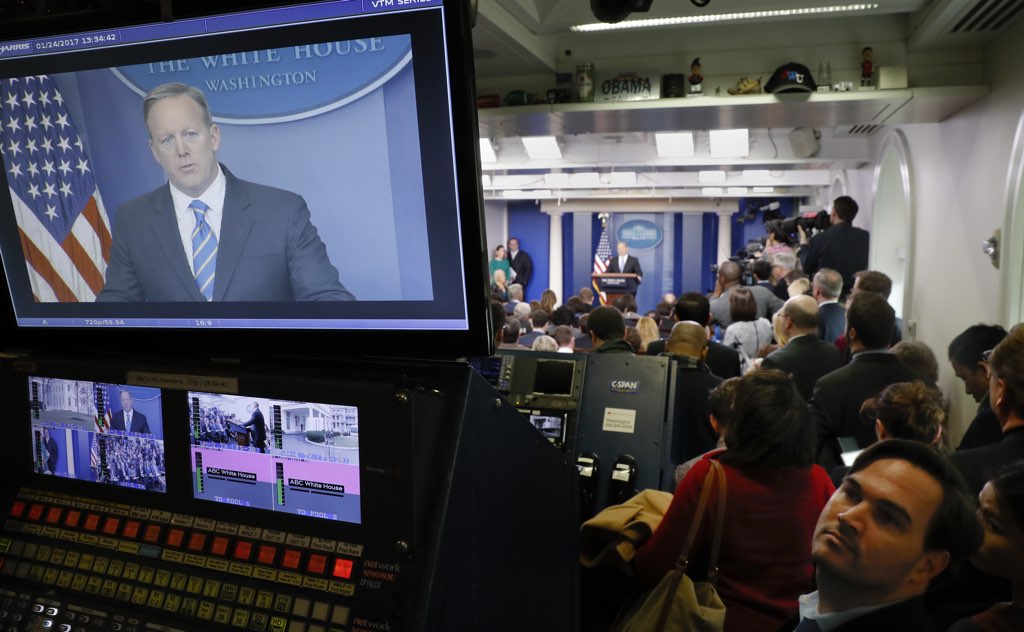For all the pre-inauguration fretting about what Donald Trump‘s administration would do to the White House press corps, the scene inside the Brady Briefing Room hasn’t really changed much two weeks in. Despite early January rumors that Trump would move reporters from the cramped room at the end of the West Wing to the Eisenhower Executive Office Building next door, the briefing room continues to resemble an overstuffed, badly designed shared-office space where the lunch table is right next to the bathroom and where everyone still crowds together for the daily briefing.
The biggest differences between former President Barack Obama‘s press secretaries and Trump’s spokesman, Sean Spicer, are still stylistic at this point, longtime denizens of the briefing room say. In fact, the Trump team—which officially casts media as the “opposition party”—might be leaning on its supposed enemies to make it through the transition period, as previous new administrations have.
“The first couple months, the press office folks are trying to get their sea legs,” said a cameraman who’s been working the White House beat since Ronald Reagan’s second term. “We’re trying to help them figure it out.”
Moving into new office space is never smooth, and Spicer’s performance on the podium so far has been mixed. He made his debut with a demonstrably false tantrum about crowd sizes, he reportedly got harangued by his boss over his wardrobe, he’s made inaccurate statements about the National Security Council, he printed out Twitter.
Thursday’s briefing was notable if only that it was his shortest one yet: 25 minutes, of which the first eight were spent going over Wednesday’s events, the President’s daily schedule, and the weekend trip to Trump’s Mar-a-Lago estate in Palm Beach, Florida. The remaining time only allowed for ten questions; still, that was enough to display some of the procedural changes that have hit the briefing room.
Spicer’s first question Thursday came from Katie Pavlich, an editor from the conservative commentary website Townhall.com and a contributor to Fox News. If it wasn’t obvious at Spicer’s first briefing on January 23, when the New York Post went first, the custom of the Associated Press starting the questioning isn’t coming back any time soon. In fact, the AP didn’t get a question in yesterday.
But if there’s any movement toward chucking the old conventions of White House reporting, it’s slow inside the room. It’s still largely a beat inhabited by veteran reporters who could do better work relying on their ingenuity and entrepreneurial skills than overly formalized access. The White House Correspondents Association’s annual dinner is still on for April 29. Even though it’s obvious from his choice of questioners that Spicer is going to make room for Trump-friendly outlets, the briefings don’t feel that different. The biggest gripe anyone had yesterday was that Spicer cut it off after less than half an hour, even though he’s also already done a few 90-minute marathon briefings.
The early days ofmayb any Presidential administration are ripe for awkwardness, though. Obama’s first press secretary, Robert Gibbs, only gave a two-minute preamble before his first briefing in January 2009, but he was still in the process of getting comfortable with the role. And as “controversial” as it is for Spicer to bump the AP from the front of the line in favor of a right-leaning publication, it was big news eight years ago when Obama himself took a question from the liberal-leaning Huffington Post. Of course we should hope the White House doesn’t speak only through media that agree with its agenda, but Trump’s administration isn’t be the first to bring new, ideologically driven outlets into the mix. (And if you need reminding that one does not need official access to reach the President, the “failing” New York Times‘s Maggie Haberman is still able to get Trump on the horn.)
The “Skype seats” Spicer rolled out on Wednesday went to two local-television reporters, a community-newspaper publisher in Kentucky, and a talk-radio host who addressed the press secretary—a Navy Reserve officer—as “Commander Spicer.”
Questions about how the Skype questions went over were met largely with eye-rolls and chuckles. “That thing’s gonna be ridiculed,” one of the briefing room’s old guard said.
If there’s one thing that unifies the room right now, though, it might be fatigue. Trump’s early-morning tweets and executive orders that spark weekends full of protests have made the White House a seven-day beat, to say nothing of the underlying fact that he’s a widely disliked public figure who lost the popular vote by nearly three million.
“Everybody’s just beleaguered,” the longtime cameraman said.
Still, it’s not all terrible. A presidency that creates scandal at all hours is good for the timesheet. “There’s so much overtime,” he said. “The first 100 days are going to be like Clinton-Lewinsky without the sex.”

















